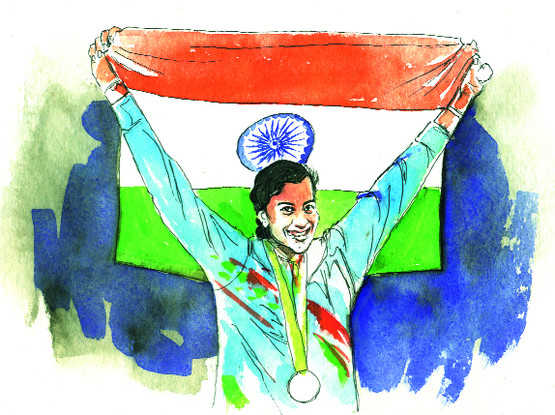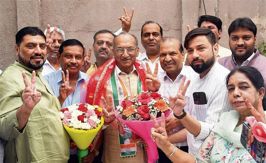
Illustrations by Sandeep Joshi
Harish Khare
Last Friday night the entire nation was glued to television screens, applauding and goading PV Sindhu to discover within her that extra bit of gumption in her quest for the Olympic gold against a superior player from Spain. Cheering an individual sportsperson offers a catharsis of a kind different from when we are shouting ourselves hoarse in support of our national team; national prestige and honour invariably get worked up into a victory or loss in the team sport.
But in a singles event, a sportsperson pits himself/herself in a contest of will, skill and stamina. Character, temperament and training come into play. There was a certain nobility in which Sindhu sought to regroup her wits, determination and technique. But her opponent of the evening played better badminton. And, that is all that matters. Surely, there can be no shame in losing, as long as the battle is fought hard and honourably.
The frenzy that our television channels had managed to whip up since Friday morning was frightening. It was an instructive lesson on how to generate mass hysteria. In the end, we ended up putting far too much pressure on a 21-year-old woman. It was as if each one of us wanted her to help rescue us from the current national mood of despondency and morass.
As it is our wont, we will be heaping Sindhu and Sakshi Malik with accolades and awards. And no one would grudge that indulgence. Yet, we will need to see to it that these two young sportspersons — and, many others like them — are not made to feel content and sated with their Rio achievements.
That a country of more than one billion should be going bananas over winning just one silver and one bronze, perhaps, suggests our desperate need for national heroes. Every society needs a hero whom it can worship, adore and genuinely respect. A hero is a hero because he/she embodies qualities and achievements which most people want to achieve but find those accomplishments beyond their reach. Our agony and ecstasy at the very meagre medal haul at the Rio Olympics underline our current subconscious disappointment with the bogus heroes, whose sleight of hand we now are able to see clearly. All our collective ebullience and energy is being channeled to petty pursuits. A nation that feels enormously satisfied at badmouthing Pakistan evening after evening must learn to be satisfied with just two medals.
The 'chief' of the Indian Army is perhaps the most respected and most revered institution, inviting respect and consideration from one and all — and, much more than a prime minister or a governor or a chief justice. The Chief of the Indian Army symbolises the honour and dignity of the 'fauj' — not just to the officers and jawans but also to the citizens.
How does this respect remain intact when reports appear from time to time of bad blood among the generals at the highest level?
The current Army Chief, Gen Dalbir Singh Suhag, has broken open the cupboard and skeletons are tumbling out. General Suhag is reported to have alleged that he was victimised by the then Chief of Army Staff (Gen VK Singh). General Suhag accuses his former boss of instigating “false, baseless and imaginary allegations of lapses” against him.
Gen VK Singh is no stranger to controversy. He waged — and, naturally lost — what many good soldiers thought was not a very honourable war against the government on the issue of his date of birth. To the horror of old-fashioned soldiers, he took the matter to the Supreme Court and was rejected and chastised. More than a slap for him, the apex court’s rebuff was a loss of face for the entire Army.
Though there are well-established inhouse mechanisms for resolving disputes among officers in the matters of service condition, promotion and punishment, a spat at the highest level of the Army command does not enhance anyone's prestige or honour.
As it is, the good men and women who make up the ranks of our glorious armed forces have a difficult time remaining uncontaminated by the all-round moral decay and political chicanery. But, when the generals are seen as engaging in personal spats, the whole institution suffers.
May I recommend a delightfully funny book on a phenomenon we are all familiar with and occasionally indulge in: queue-jumping?
V Raghunathan’s The Good Indian’s Guide to Queue-jumping is a witty essay on how we Indians love to jump the queue.
In a country of one billion and more people, there simply is no escape from forming lines, waiting patiently in line for your turn to be served. Otherwise there would be extreme disorder, anarchy and violence at places like railway stations, bus stands, hospitals, canteens etc.
But Raghunathan argues that all of us resent queuing up. He recalls Amitabh Bachchan’s famous line from Kaalia film: Ham jahan khade ho jaate hain, line wahin se shuru hoti hai. That just sums up our cultural trait. The powerful do not want to stand in the line, and the not-so-powerful try to get away — if they can — from breaking the line.
Raghunathan manages to command attention and interest as he steers the reader through the fine print of the psychology, physiology and sociology of queues, and then offers some meditation on the ethics of queue-jumping.
“Yes, such is our social norm — not only jumping queues but also doing it by hook or crook, or even with outright and in-your-face lies. In a society where queue-jumping is the rule rather than the exception, any iterative game-theoretic plays will suggest that you would be a chump not to jump queues yourself. As a society, we have resolved not to set examples for others. Does this mean we are patient with such brazen queue-jumpers? My take is no; we are fatalistic. We have far too many other, and way more important, battles to fight just for survival. So why bother about this little battle about a lousy queue-jumper?”
Yes, why indeed? I believe that forming queues and staying in the line is an indication of a society’s respect for norms and rules. A lawful society encourages — and rewards —those who subscribe to the discipline of queue-forming.
Speaking for myself, I am happy to wait in line, most of the time. The only line I find very distasteful to observe is the queue for food at receptions/dinners/lunches. Sometimes I prefer to wait for the line to disappear, and, other times, I jump the queue.
But I am inclined to endorse fully Raghunathan’s sober conclusion that it all adds up to our society’s disregard for fairness and concern for others.
It is a book each one of us should read. It would force us to recall embarrassing moments as also help us understand the curative power of forming and waiting in a queue for our turn.
The other day a friend of mine from America sent me this gem, with a caveat that those of the younger generation may not, of course, know half of the following:
1981 & 2005: Two Interesting Years
Interesting Year 1981
- Prince Charles got married.
- Liverpool crowned soccer Champions of Europe.
- Australia lost the Ashes.
- The Pope died.
Interesting Year 2005
- Prince Charles got married.
- Liverpool crowned soccer Champions of Europe.
- Australia lost the Ashes.
- The Pope died.
The moral of the story: The next time Prince Charles gets married, someone should warn the Pope.
That calls for a cup of piping hot coffee.
Join me.



























